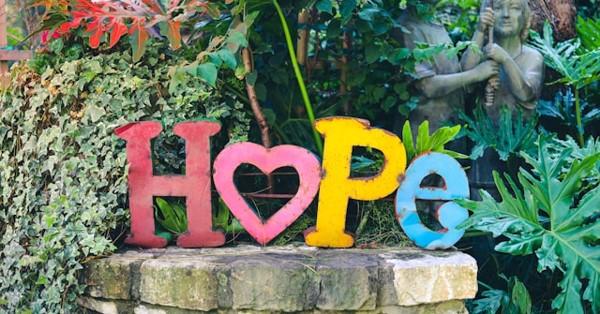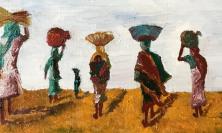St Paul wrote to the Corinthians about the abiding gifts of faith, hope and love in a passage that is often used to explore the nature of the latter. But considering them together yields other fruits: ‘it seems that Paul’s triad – faith, hope and love – belong together not just when it comes to God’, writes the London Jesuit Centre’s Stuart Jesson as he considers the character, function and importance of hope.
In some circles – and perhaps for some good reasons – hope has a bad name at present. The comedian Marc Maron begins his latest stand-up comedy special, From Bleak to Dark, by cranking the planetary despair up to 11: ‘I don’t mean to be negative, but I don’t think anything is ever going to get better ever again. I think this is pretty much the way it’s going to be for however long it takes us to polish this planet off. And don’t misunderstand me – I have no hope; I think that if you have hope, what are you f***ing seven?!!’[1] This is species-level gallows humour, and the extremity of the pessimism is played for laughs.
But underneath is a very serious point: what if hope is nothing more than childish wishful thinking? It is a thought that has been expressed in a more measured way by various thinkers including, recently, some theologians. Miguel De La Torre – a former president of the US-based ‘Society for Christian Ethics’ – recently published a book called Embracing Hopelessness, which has been widely read in some theological circles. It suggests that Christian hope – seemingly preoccupied with ‘the life of the world to come’ – has often been little more than a means of avoiding an encounter with reality, and with the urgent needs of the present. It is a kind of avoidance mechanism: ‘hope whitewashes reality, preventing praxis from formulating. [. . .] hope becomes an excuse not to deal with the reality of injustice’.[2] In other words, people often opt for the superficial consolation of hope rather than engage with the world as it actually is, now – a world in which we may well find ourselves complicit in injustice of various kinds. A very similar intuition led the American theologian Anthony B. Pinn to move away from belief in God altogether. He concluded that any appeal to faith in a transcendent realm and the ‘evidence of things hoped for’ necessarily involves looking away from the difficult realities and demands of the present. He concluded that all the theologian’s pronouncements end up being ‘a matter of what she would like without sustainable regard for what is’.[3]
But of course, the question of what it means to have ‘sustainable regard for what is’ is not straightforward. The German theologian Jürgen Moltmann, writing in the late 1960s, claims that hope runs through the entirety of Christian theology. But for Moltmann, this does not mean that it is ‘unrealistic’, because it turns out that being ‘realistic’ is no straightforward task. What we call ‘reality’ is not fixed and static, and the world that will be is shaped by our own desires, hopes and expectations. ‘Reality’ it is a field of possibilities and, he thinks, ‘only hope can take seriously the possibilities with which reality is fraught’.[4]
Love, hope and reality
One way to reflect more deeply on the nature of hope is to ask what it has to do with love – something Christians have been doing since St Paul lined up faith, hope and love as the three that ‘remain’ in 1 Corinthians 13. Karl Rahner gives a fascinating account of the underlying unity of hope and love when he links hope to the capacity to be open to ‘the uncontrollability of God’. According to Rahner, even on the other side of eschatological completion we will still love God in and through hope, because to hope is to await that which exceeds our grasp and remains beyond our control, and God will forever be beyond our control.[5]
But we might also want to ask about the relationship between hope and love of neighbour: is hope somehow a part of what it is to love another person – and if so, how? To reflect further on this, I think that we need to get clear on what we mean by love in the first place. A traditional way of answering the question ‘what is love?’ is to say that love has two sides: to desire good for another; to desire for union with another.[6] So, we can say that love wants the best for others; and love wants to be with others.[7] Love in its fullest, deepest form, involves both sides. We can see why both being for and being with are essential to love by thinking about the love a parent has for their child. A truly loving parent wants the best for their child, of course. But a parent who doesn’t also want to be with their child, who desires no union with them, does not love them fully. Children – or speaking more honestly, all of us – have such a deep need to be treasured by others that parents can only fully do the best for their children by delighting in their presence. Children who know that they are the cause of joy in another have been given something deeper and more lasting than children who just see their parents’ constant attempts to do things for them.
I think that we can shed some light on what hope has to do with our love of each other by thinking first about the connection between love and reality. One thing that hinders our presence to each other, and our capacity to be with each other, is the fear of, or resistance to, reality: both the fear of what we might find if we let our love encounter the reality of others, and the fear of being seen fully, as one is. And perhaps we could even say, with Simone Weil, that love is the dawning sense that other people are real, not just there to drop in and out of the drama of my own life on cue. Whereas our natural egoism gives us the sense that the reality of things diminishes the further away something is from ourselves, love is the thing that disrupts this. So, ‘to believe in the reality of the outside world and to love it – these are but one and the same thing.’[8]
This point helps us to see why love and truth belong together – and why it makes sense to speak about the love of truth. Consider, again, Weil’s extraordinary words: ‘Truth is the radiant manifestation of reality. [. . .] To desire truth is to desire direct contact with a piece of reality. To desire contact with a piece of reality is to love. We desire truth only in order to love in truth.’[9] This seems particularly true in the case of loving relationships because real communion with others is only possible where there is truthful encounter with others as they are. C.S. Lewis articulates something very similar to Weil in A Grief Observed. He found that he was horrified at the prospect that his mental image of his deceased wife would, over time, gradually become little more than the work of his own imagination, something that lacked ‘[t]he rough, sharp, cleansing tang of her otherness’. And he also noted that this was the most precious gift of marriage: the regular encounter with the reality of another; ‘this constant impact of something very close and intimate yet all the time unmistakably other, resistant— in a word, real.’ [10]
So love involves a deep desire for the reality of others; it is through love that we first become deeply dissatisfied with illusion. And we might well conclude that it is ultimately love that powers the desire for truth. If, then, we are to think of love and hope as being in harmony, we must also find a way to understand the connection between hope and the love of truth; between hope and love’s hunger for reality. And this is where things seem most difficult because, as we saw above, it is the relationship between hope and reality that is where the problems lie. Is it obvious that our hopes can handle reality?
The cross and the worst that can happen
It is quite easy to see that love produces the desire for what is not, or for what is not yet. Love makes us dissatisfied with anything less than the best for those we love. Love compels us to ask: what is the best that could be hoped for, for the ones we love? If those we love are sick, we hope for their recovery. If they are unhappy, we long for them to be joyful. But of course, this often leaves lovers in a desperate situation. The truth is that reality often seems inhospitable to the deepest hopes we have for those we love; in the worst cases, truth punctures our hopes in the most brutal fashion. Love may well long for reality, but what if, as C.S. Lewis wondered, ‘reality, looked at steadily, is unbearable’?[11]
So we seem to be back to same problem with which we started: what if hope is nothing more than a way of avoiding looking steadily at what is unbearable? And to what do we owe the deepest allegiance: the hopes that are born of love, or the reality that constrains and sometimes shatters these hopes? This tension is felt by everyone, at some point, in the pain of grief: the desire to be with someone who can no longer be present to us. The desire is real – but so is the absence that frustrates it. But even more seriously, it is felt when we contemplate the worst things that happen to those we love, or the most serious injustices. In these cases we experience the outrage and indignation that comes from love – from the unfulfilled desire for the best for those we love. If love means to will the best for others, perhaps there is no escaping this outrage, or anger, not for those who love.
If nothing else, the Christian story, and the cross at its centre, should alert us to this: the worst that can happen to a person is pretty bad. Coming to an awareness of the reality of some of the worst examples of misfortune or cruelty pushes us to ask the hardest questions about the world. In view of this things, people who believe in God tend to ask the question of whether God is good, or whether God exists at all; but questions with a similar shape emerge for people who don’t believe in God, as well. In the face of the worst that can happen, is reality hospitable to love, and goodness, or to whatever values that we hold most dear? Do our deepest hopes go with ‘the grain of the universe’?[12] Or, as the Australian philosopher John Bishop puts it, can we find ‘an account of reality as favourable to a steadfast and hopeful commitment to [our] ethical ideals’?[13] And if we cannot, what happens to those ideals, and the hopes that they express? This is why what is sometimes known as ‘the problem of evil’ refuses to sit in an obscure corner of our mental universe, to be resolved by people with the appropriate skills and enough patience. At some point, everyone has to face the problem of how to reconcile reality with the hopes that love dreams up within them.
The problem is especially acute when we consider cases of children who are cruelly robbed of the chance to live a full life. A loving parent wants the best that is possible for their child, and to be with them in the richest sense of that word. But what about the parent whose child is killed by a falling building in Gaza, in a sinking ship in the Channel, or a stabbing in East London? What can love desire when all access to the best that could be hoped for has been blocked? Reality, in these cases, seems not just to limit our love, but actually to resist and crush it. It appears that the relationship between love and reality might be horribly asymmetrical. Love passionately longs for the real presence of the beloved; reality, on the other hand, is indifferent to love, quite willing occasionally to crush its deepest hopes.
One common Christian response to the problem of evil is to appeal to a greater good that somehow justifies the destroyed lives, or crushed hopes; to say that God has, or must have, a ‘morally sufficient reason’ for allowing reality to wreak such havoc. Perhaps the value of free will, and responsibility that it makes possible outweighs the sufferings caused by moral evil;[14] perhaps, because ‘all things work together for the good of those who love him’, we will find that even the worst evils can contribute to the process of ‘soul-making’.[15] And a common response to this kind of reasoning is visceral moral outrage: how dare we even consider the idea that the lives of innocent children could be necessary collateral damage on the way to a final harmony? What kind of God are we conceiving of, if we imagine God planning this particular route to beatitude?[16]
This kind of argument can be endless, and ‘the problem of evil’ doesn’t seem to be in danger of being decisively solved any time soon. But these kinds of problems arise not just as a logical problem about the compatibility of a series of claims, but as an existential problem, as a result of the conflict between love and reality: if love wants the best, then love wants something much, much better than what reality allows, or seems to allow, for a great many people. So it seems that Paul’s triad – faith, hope and love – belong together not just when it comes to God, but in our love for each other. In our love for each other, we also find that the desires to which love gives rise exceed what is possible – at least, in reality as we know it. Something has to give. Either we allow our love periodically to recede and relent under the pressure of reality, so as to conform itself to what is possible. Or, we must let ourselves imagine reality opening up at the invitation of love – reality doing love’s bidding. And ‘reality doing love’s bidding’ is perhaps one way to gesture towards whatever it is that Christians are talking about when they talk about hope for the life of a world that is yet to come.
At the limit it seems that there is no love without hope, and no hope without faith: love leads us to hope for that which can only be glimpsed through faith. Hope is faith in the reality of love; it is the fruit of love’s wrestle with reality.
If you want to delve further into the philosophy and theology of hope, the London Jesuit Centre’s course on ‘Hope’ will explore the difference between authentic hope and superficial optimism, and whether hopeful people can also be realistic people. The course begins on 27 February 2024, in person and online.
Stuart Jesson graduated with a degree in Literature and Theology from the University of Hull in 2000. From 2003-9 he studied Philosophical Theology part-time at the University of Nottingham, whilst continuing to work in the third sector with vulnerably-housed or homeless people, and young asylum seekers. He was lecturer at York St John University for almost a decade, before moving to the London Jesuit Centre in 2021, where he is the lead for theology.
[1] From Bleak to Dark is available on HBO, and contains much that is likely to cause offence.
[2] Miguel De La Torre, Embracing Hopelessness (Minneapolis: Fortress Press, 2017), p. 141.
[3] Anthony B. Pinn, ‘Theology after Hope and the Projection of Futures’ in American Journal of Theology & Philosophy, 40: 2 (2019), p. 27 (italics mine).
[4] Jürgen Moltmann, The Theology of Hope, trans. James Leitch (London: SCM Press, 2002), p. 10.
[5] Karl Rahner’s essay on hope is a good starting point: see ‘On the theology of hope’ in Theological Investigations X, trans. David Bourke (London: Darton, Longman and Todd, 1973). Rahner’s focus is on the way that hope involves an openness to mystery, to God as ‘the uncontrollable’.
[6] This is Thomas Aquinas’s account of love. See Eleonore Stump, ‘Love, by All Accounts’ in Proceedings and Addresses of the American Philosophical Association, 80:2 (2006), pp. 25–43.
[7] See Sam Wells for an account of the importance of ‘being with’ in theology and Christian life, especially A Nazareth Manifesto: Being With God (Chichester: Wiley Blackwell, 2015), esp. pp. 1-19; 125-147.
[8] Simone Weil, The Notebooks of Simone Weil, trans. Arthur Wills (London; New York: Routledge, 2004), p. 299.
[9] Simone Weil, The Need for Roots: Prelude to a Declaration of Duties towards Mankind, trans. Arthur Wills (London; New York: Routledge), p. 250.
[10] C.S. Lewis, A Grief Observed (London: Faber and Faber, 1961), pp. 17-18.
[11] As C. S. Lewis claimed in A Grief Observed.
[12] Theological use of this phrase comes from John Howard Yoder, and is quoted by Stanley Hauerwas in With the Grain of the Universe: The Church’s Witness and Natural Theology (London: SCM Press, 2001), p. 17.
[13] John Bishop, ‘Identifying the Problem of Evil’ in The Problem of Evil: Eight Views in Dialogue, ed. N. N. Trakakis (Oxford: Oxford University Press, 2018), p. 43.
[14] See, e.g., Richard Swinburne, Is There a God? (Oxford: Oxford University Press, 1996), pp. 95-113.
[15] The famous phrase used by John Hick. See Evil and the God of Love (Basingstoke: Palgrave Macmillan, 2007).
[16] See Nick Trakakis, ‘Theodicy: The Solution to the Problem of Evil, or Part of the Problem?’ in Sophia, 47:2 (2008) and Toby Betenson, ‘Anti-Theodicy’ in Philosophy Compass, 11: 1 (2016), for two useful overviews of this intuition.






